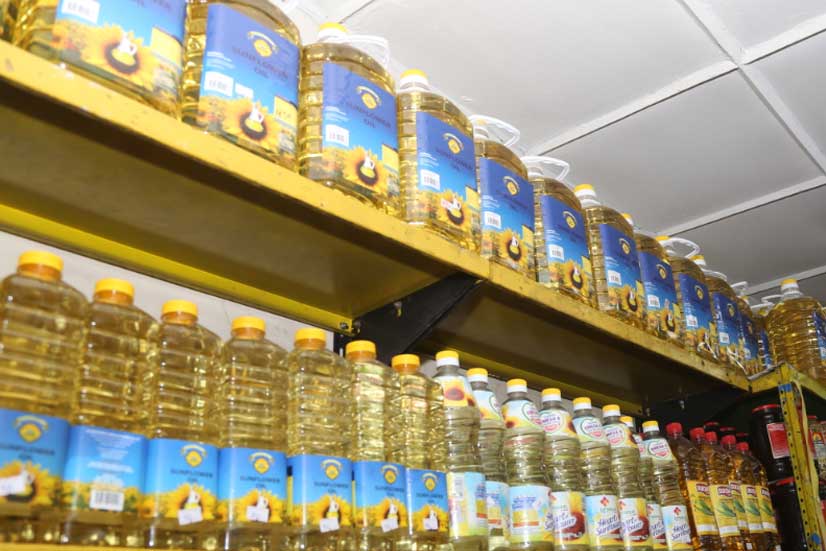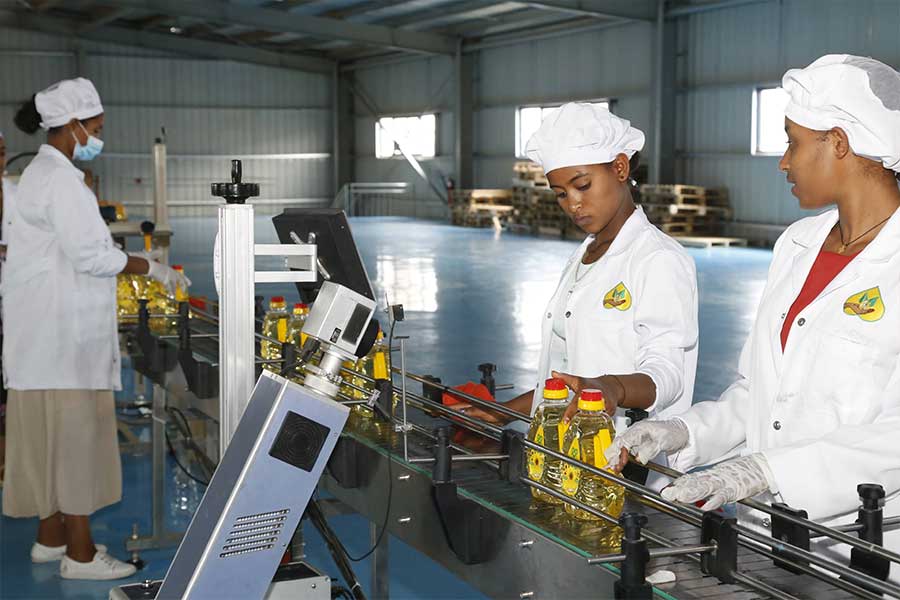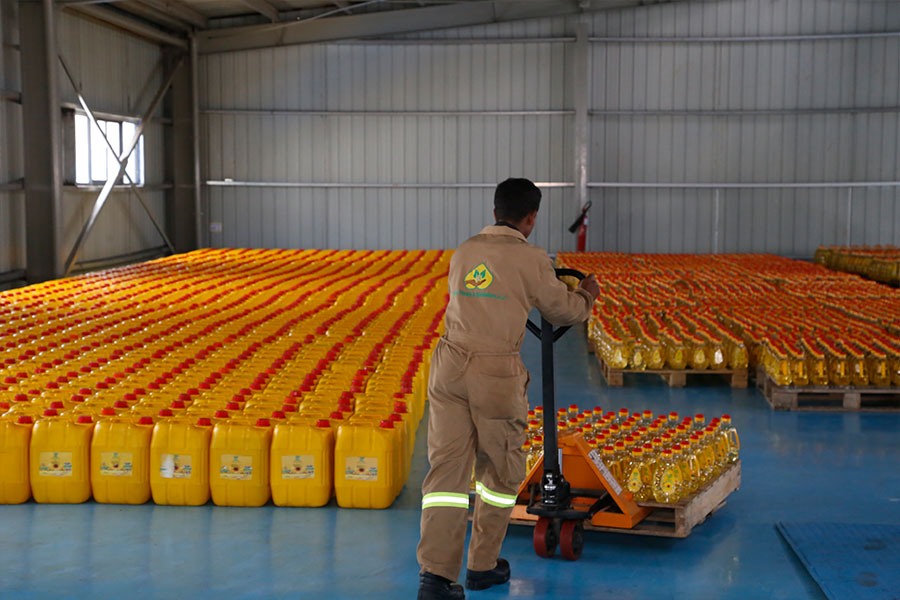
Dec 28 , 2019
By ELIAS TEGEGNE ( FORTUNE STAFF WRITER )
DBE provided 80pc of the investment for the edible oil factory
Edible oil and agro-processing plants are set to break ground in Benishangul-Gumuz Regional State with a combined investment of 230 million Br from two farmers unions.
For the two plants, the Federal Cooperative Agency (FCA) conducted a feasibility study with the Assosa Farmers Multipurpose Cooperative Union and the Assosa Farmers Cooperative Union last year.
The oil refinery plant, which has a capacity of refining three million litres of oil a year from niger, soybean and groundnut seeds, will be set up by the Assosa Farmers Multipurpose Cooperative Union. The fruit and vegetable processing plant, which produce 16,181tn of tomato and mango products a year, will be established by the Assosa Farmers Cooperative Union.
The oil refinery plant can process 45,000ql, 85,500ql and 19,500ql of niger, soybean and groundnut seeds to produce 1.3 million, one million and 741,000lt of edible oil, respectively, a year. Expected to cost 51.2 million Br, the Development Bank of Ethiopia will be covering 80pc of the investment through a loan. The remaining balance will be in cash equity contribution from the Union.
The country has an annual production capacity of 784,809tn of edible oil with an average per capita consumption of 8.9lt of oil a year. Two years ago, there was a shortfall of 15,532tn of edible oil in the country.
The Agency aims to meet the oil demand and improve the market share of the unions, according to Ayalsew Workneh, public relations director of FCA.
Occupying 2,000Sqm of land, the oil plant is expected to create direct job opportunities for 81 people from the member cooperatives and the local community.
Since the Regional State is known for the production of oil seeds like sesame, niger seed, groundnut and soybeans, the plant will source the seeds from the local area, according to Eshetu Chekole, general manager of Assosa Farmers Multipurpose Cooperative Union.
Established by eight primary cooperatives with 2,674 member farmers who contributed 87,000 Br in capital, the Union is involved in marketing oilseeds, niger oil processing and input distribution. Currently, the number of primary cooperatives affiliated with the union has reached 58 with more than 15,000 member farmers.
The second plant, a mango and tomato processing plant, will have a capacity of processing 18,000tn of mangoes and 10,800tn of tomatoes a year to produce 954tn of mango jam, 13,305tn of mango juice and 1,922tn of tomato paste.
Having a total investment cost of 179.4 million Br, the agro-processing plant will use 130.2 million Br for capital expenditures with the remaining set aside for initial working capital. The processing plant will be erected in Assosa town within the compound of the Union.
The main objective of the plant is to minimise the post-harvest wastage of the fruits by adding value, addressing the market problem and increasing the productivity of the farmers and their income, according to Weldedawit Teka, general manager of the Assosa Farmers Cooperative Union, which was established by 16 multipurpose primary cooperatives with 1,848 individual members.
Thirty percent of agricultural products are wasted due to the traditional way of harvesting and an improper market chain. Mangoes and tomatoes are also known to be highly perishable.
The Regional State, which has a total of 22 cooperative unions, 17 of which are agricultural cooperative unions with 67,162 individual farmer members, is known for a higher harvest of mangoes and vegetables.
Last year 105,000tn of mangoes were harvested at the national level, and 28pc of it was cultivated from Benishangul-Gumuz Regional State.
During peak harvest seasons, fruit and vegetables are sold at throwaway prices because of a lack of means to preserve and store the products, according to Weldedawit.
"The plant will make the fruits and the vegetables accessible during off-production seasons and also increases their value," he said.
It will also save foreign exchange by substituting imports, according to Ayalesew.
Mulubrihan Bayissa, lecturer and head of the Department of Agricultural Economics & Agribusiness Management at Jimma University, said the plants will benefit the farmers by cutting out the middlemen in the value chain who make more money than the farmers.
He also suggests the Agency train the farmers to practice a modern harvesting system to increase productivity and profitability.
PUBLISHED ON
Dec 28,2019 [ VOL
20 , NO
1026]

Commentaries | Nov 13,2021

Radar | Jul 31,2021

Radar | Oct 16,2021

Fortune News | Dec 14,2019

Fortune News | Aug 10,2019

Radar | Oct 23,2023

Life Matters | Jul 03,2021

Agenda | Mar 12,2022

Fortune News | May 11,2019

Fortune News | Jul 08,2023

Dec 22 , 2024 . By TIZITA SHEWAFERAW
Charged with transforming colossal state-owned enterprises into modern and competitiv...

Aug 18 , 2024 . By AKSAH ITALO
Although predictable Yonas Zerihun's job in the ride-hailing service is not immune to...

Jul 28 , 2024 . By TIZITA SHEWAFERAW
Unhabitual, perhaps too many, Samuel Gebreyohannes, 38, used to occasionally enjoy a couple of beers at breakfast. However, he recently swit...

Jul 13 , 2024 . By AKSAH ITALO
Investors who rely on tractors, trucks, and field vehicles for commuting, transporting commodities, and f...

Jul 12 , 2025
Political leaders and their policy advisors often promise great leaps forward, yet th...

Jul 5 , 2025
Six years ago, Ethiopia was the darling of international liberal commentators. A year...

Jun 28 , 2025
Meseret Damtie, the assertive auditor general, has never been shy about naming names...

Jun 21 , 2025
A well-worn adage says, “Budget is not destiny, but it is direction.” Examining t...